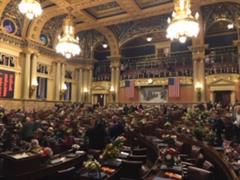Subscribe for Weekly Updates

Ever Receive a Dated Tax Notice from the Pa. DOR? Act 90 of 2019 Establishes a 10-Year Collection Window
By Peter N. Calcara, vice president – government relations
Legislative victories do not come easily in Harrisburg. As I have said more than once – in this blog and in other places – the process is designed to be slow, deliberative, and, more often than not, cumbersome. It would seem a simple endeavor to gain 102 votes in the state House and 26 in the Senate for a bill to pass and be sent to the governor to be signed into law, but the reality is that it is not. And for good reason. Reviewing and vetting legislation – done properly – is time-consuming, even when the issue is noncontroversial. Here’s a quick scorecard at the halfway point of the 2019-2020 session to highlight this point: state lawmakers have introduced nearly 3,000 bills (2,028 in the House and 936 in the Senate) in 2019, with 118 of those being signed into law. That translates into about 4% of the non-budget-related bills making their way through the process.
 Timing and subject matter are two huge variables within the process. Bills typically get bottlenecked in committees or on calendars, only to break free around a major event like the budget or the end of session. That’s when the major horse trading occurs: members become more willing to vote for the budget or another piece of major legislation to get one of their bills through to the governor’s desk. Subject matter can also limit the legislative window of opportunity. For example, there is usually only one tax bill a year, and it coincides with the overall budget. There are exceptions (last year’s depreciation bill), but that general pattern has held consistent for at least 30 years.
Timing and subject matter are two huge variables within the process. Bills typically get bottlenecked in committees or on calendars, only to break free around a major event like the budget or the end of session. That’s when the major horse trading occurs: members become more willing to vote for the budget or another piece of major legislation to get one of their bills through to the governor’s desk. Subject matter can also limit the legislative window of opportunity. For example, there is usually only one tax bill a year, and it coincides with the overall budget. There are exceptions (last year’s depreciation bill), but that general pattern has held consistent for at least 30 years.
It was no small feat, then, that the PICPA, working with our allies in the General Assembly, was able to secure an important legislative victory as the clock was winding down on 2019. On Nov. 27, Gov. Tom Wolf signed into law legislation amending the State Tax Code that will help both taxpayers and practitioners deal with those unnerving letters from the Pennsylvania Department of Revenue (DOR). You know the ones: they usually say something like “According to the DOR’s records, the taxpayer did not file a return in 1992.” Or 1982. Pick the year. The bottom line for the taxpayer (and the practitioner) is that, in most cases, the records for these far-off years are long gone, and the taxpayer cannot prove that he or she, in fact, filed a return for the year in question. Typically, the only recourse for the taxpayer has been to pay the tax owed and any interest and penalties.
House Bill 17, now Act 90 of 2019, was the culmination of more than a year’s work over two legislative sessions of the General Assembly. The bill passed both the House and Senate in bipartisan fashion – 178-9 and 48-1. The law, which is similar to federal law, establishes a 10-year collection window for taxes owed to Pennsylvania. The provision applies to all taxes collected by the state DOR, except the inheritance tax, and includes exceptions including, but not limited to, cases of fraud or willfully failing to file a return. Act 90 also increases the time period for criminal tax prosecutions; provides the DOR with the authority to conduct administrative bank attachments for the purpose of delinquent tax collection; and, beginning Nov. 27, 2019, excludes ready-made computer software directly used in conducting the business of banking from sales and use tax.
Progress through the legislative process requires a number of champions. Leading the charge in the House were PICPA member state Rep. Frank Ryan, CPA (R-Lebanon), prime sponsor of House Bill 17, as well as Rep. Mike Peifer (R-Pike), chair of the House Finance Committee. Sen. Joseph Scarnati, President Pro Tem (R-Jefferson), and Sen. Pat Browne, CPA (R-Lehigh), were instrumental in navigating the upper chamber. Other champions included Sen. Scott Hutchinson (R-Venango), chair of the Senate Finance Committee; Sen. John Blake (D-Lackawanna), Democratic chair of the Senate Finance Committee; and Reps. George Dunbar (R-Westmoreland), Keith Greiner (R-Lancaster), and Ben Sanchez (D-Montgomery). Lastly, the PICPA Committee on State Taxation was hugely instrumental in drafting legislative language, reviewing various amendments, and meeting with the DOR and legislators in support of the proposal. As the committee’s work proves, when accounting professionals join the PICPA and become engaged in advocacy efforts, we can move mountains!
As we embark on a new year, the PICPA government relations team wishes all a healthy and prosperous 2020.
Sign up for weekly professional and technical updates in PICPA's blogs, podcasts, and discussion board topics by completing this form.







Leave a commentOrder by
Newest on top Oldest on top